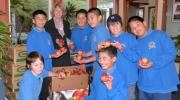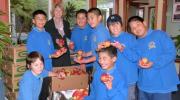NZ must retain GE-free advantage
It is disappointing that Federated Farmers is opposing council caution around genetically engineered organisms, according to the Soil & Health Association. Federated Farmers has lodged an appeal with the Environment Court, opposing the Northland Regional Council’s precautionary policy on GE.
“Consumers and markets around the world want GE-free products, so it makes economic sense to retain New Zealand’s enviable GE-free status,” says Marion Thomson, co-chair of Soil & Health.
“Federated Farmers president Bruce Wills says we need to have a sensible grown-up discussion about GE. This is exactly what Soil & Health has been engaging in for 20 or so years,” says Thomson. “GE crops have not lived up to the hype of their promoters. In fact they have led to increased use of pesticides, contamination of GE-free and organic crops, and there are increasing concerns about negative health effects.”
“When you look at all the aspects of the debate, including the science, the economics, the environmental, social and community aspects, there are multiple reasons to retain our reputation as clean, green, GE-free New Zealand. On top of that, we can enhance our health, environment and markets by increasing organic production.”
Several farming groups, including Pure Hawkes Bay and the Organic Dairy and Pastoral Group, support the advantages of being GE-free. Overseas, farmers have lost their GE-free or certified organic status because of contamination from GE crops planted by their neighbours. This has resulted in a drop in income as well as extra time and money spent on court battles and on reorganising their farm production.
Media contact: advocacy@organicnz.org.nz, 09 419 4536
Soil & Health, established in 1941, is one of the world’s oldest organic organisations and publishes Organic NZ. We advocate for people’s right to have fresh, healthy, organic food and water free of GE, pesticides and additives. Oranga nuku, oranga kai, oranga tangata.


